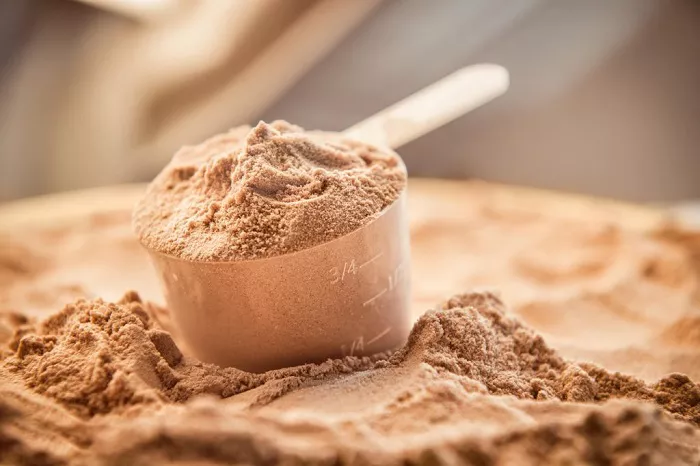Protein powder has gained significant popularity in the fitness and wellness industry. It is a convenient and easily accessible source of high-quality protein, which is essential for various physiological functions in the body. In this article, we will delve into the intricacies of protein powder and explore its functions, benefits, and considerations for usage.
Understanding Protein Powder
Protein powder is a dietary supplement that is typically derived from animal or plant sources. It is processed to isolate or concentrate the protein content, resulting in a powdered form that can be easily mixed with liquids or incorporated into recipes. Protein powder offers a concentrated dose of protein, which is crucial for muscle repair, growth, and overall health.
Function of Protein Powder
- Muscle Recovery and Repair: One of the primary functions of protein powder is to facilitate muscle recovery and repair. During intense exercise or physical activity, muscle fibers experience micro-tears. Protein, composed of essential amino acids, provides the building blocks necessary for repairing and rebuilding these damaged muscle fibers. Consuming protein powder after workouts can support the muscle recovery process, enhance muscle protein synthesis, and promote faster healing and adaptation.
- Muscle Growth and Hypertrophy: Protein powder is widely used by individuals looking to increase muscle size and strength. This is because protein is essential for muscle growth and hypertrophy. By providing an adequate supply of amino acids, protein powder supports the synthesis of new muscle proteins, leading to an increase in muscle mass over time. Combining protein powder consumption with resistance training can maximize muscle growth potential.
- Nutritional Convenience: Protein powder offers a convenient and practical way to meet daily protein requirements. It can be challenging to consume sufficient protein solely through whole food sources, especially for individuals with busy lifestyles or specific dietary preferences. Protein powder provides a concentrated and easily accessible source of protein, allowing individuals to conveniently increase their protein intake without relying solely on traditional protein-rich foods.
- Weight Management: Protein powder can also support weight management goals. Protein has a higher thermic effect compared to carbohydrates and fats, meaning it requires more energy for digestion, absorption, and processing. This can result in increased calorie expenditure and enhanced metabolic rate. Additionally, protein has a satiating effect, helping individuals feel fuller for longer and potentially reducing overall calorie intake. By incorporating protein powder into a well-balanced diet, individuals can support healthy weight management.
- Nutrient Timing and Optimization: Protein powder can be strategically used to optimize nutrient timing. Consuming protein powder before or after exercise can enhance the availability of amino acids during the critical post-workout period. This supports muscle recovery and protein synthesis, ultimately maximizing the benefits of exercise. Additionally, protein powder can be used as a convenient snack or meal replacement option, ensuring a steady supply of protein throughout the day.
Types of Protein Powder
Protein powders are available in various forms, each offering unique benefits and considerations. The most common types of protein powder include:
- Whey Protein: Whey protein is derived from milk during the cheese-making process. It is highly regarded for its complete amino acid profile and rapid absorption rate. Whey protein is rich in branched-chain amino acids (BCAAs), which are essential for muscle recovery and growth. It is a popular choice among athletes and individuals seeking rapid muscle repair and enhanced protein synthesis.
- Casein Protein: Casein protein is also derived from milk, but it has a slower digestion and absorption rate compared to whey protein. Due to its slower release of amino acids, casein protein is often consumed before bedtime to provide a sustained supply of protein throughout the night. It is commonly used to support muscle recovery during prolonged periods of fasting, such as during sleep.
- Plant-based Protein: Plant-based protein powders are derived from sources such as peas, soy, hemp, rice, or a blend of plant-based ingredients. They offer an alternative for individuals following vegetarian, vegan, or lactose-free diets. Plant-based protein powders can provide a complete amino acid profile when combined strategically. They are rich in fiber and phytonutrients, which can offer additional health benefits beyond protein supplementation.
- Egg Protein: Egg protein powder is derived from egg whites and is a complete protein source. It offers a high biological value, meaning it contains all essential amino acids in the right proportions for human nutrition. Egg protein powder is a suitable option for individuals with dairy or soy allergies or those looking for an alternative to plant-based or whey protein powders.
Considerations and Usage Guidelines
While protein powder can be a valuable addition to a balanced diet, there are a few considerations and guidelines to keep in mind:
- Individual Protein Requirements: Protein requirements vary depending on factors such as age, sex, body weight, activity level, and goals. It is essential to determine your specific protein needs before incorporating protein powder into your diet. Consulting with a registered dietitian or nutritionist can help you establish appropriate protein intake goals.
- Quality and Purity: When selecting protein powder, it is crucial to choose a reputablebrand that undergoes rigorous testing for quality and purity. Look for products that have undergone third-party testing and are free from contaminants or additives. Reading reviews and checking for certifications can help ensure the product meets high standards.
- Personal Goals and Preferences: Consider your personal goals, preferences, and dietary restrictions when choosing a protein powder. If you follow a specific diet, such as vegan or gluten-free, opt for plant-based or allergen-free protein powders. Additionally, consider the taste, texture, and mixability of the powder, as these factors can impact your overall satisfaction and adherence to incorporating it into your routine.
- Timing and Dosage: Protein powder can be consumed at various times throughout the day, depending on individual goals and preferences. Consuming protein powder within 30 minutes to an hour after exercise can be beneficial for muscle recovery. However, spreading protein intake evenly throughout the day is also important to support overall protein synthesis. Follow the recommended dosage guidelines provided by the manufacturer or seek guidance from a healthcare professional for personalized recommendations.
- Balanced Diet and Whole Foods: While protein powder can be a convenient source of protein, it should not replace whole food sources entirely. Aim to maintain a balanced diet that includes a variety of nutrient-dense whole foods, such as lean meats, fish, dairy products, legumes, and whole grains. Protein powder should supplement a well-rounded diet rather than serve as a primary protein source.
Conclusion
Protein powder serves as a valuable tool for individuals looking to optimize their protein intake, support muscle recovery and growth, and achieve their health and fitness goals. With its convenience, versatility, and wide range of options, protein powder can be a practical addition to a well-balanced diet. However, it is essential to consider individual protein requirements, choose high-quality products, and incorporate protein powder as part of a holistic approach to nutrition and overall well-being. By understanding the functions and considerations of protein powder, individuals can harness its power to unlock their full potential in pursuit of a healthier lifestyle.
[inline_related_posts title=”You Might Be Interested In” title_align=”left” style=”list” number=”6″ align=”none” ids=”3098,3096,3094″ by=”categories” orderby=”rand” order=”DESC” hide_thumb=”no” thumb_right=”no” views=”no” date=”yes” grid_columns=”2″ post_type=”” tax=””]






























